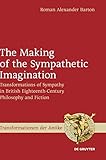The Making of the Sympathetic Imagination : Transformations of Sympathy in British Eighteenth-Century Philosophy and Fiction / Roman Alexander Barton.
Material type: TextSeries: Transformationen der Antike ; 61Publisher: Berlin ; Boston : De Gruyter, [2020]Copyright date: ©2020Description: 1 online resource (X, 210 p.)Content type:
TextSeries: Transformationen der Antike ; 61Publisher: Berlin ; Boston : De Gruyter, [2020]Copyright date: ©2020Description: 1 online resource (X, 210 p.)Content type: - 9783110624014
- 9783110624182
- 9783110625318
- 820.9/353
- online - DeGruyter
- Issued also in print.
| Item type | Current library | Call number | URL | Status | Notes | Barcode | |
|---|---|---|---|---|---|---|---|
 eBook
eBook
|
Biblioteca "Angelicum" Pont. Univ. S.Tommaso d'Aquino Nuvola online | online - DeGruyter (Browse shelf(Opens below)) | Online access | Not for loan (Accesso limitato) | Accesso per gli utenti autorizzati / Access for authorized users | (dgr)9783110625318 |
Dissertation Humboldt-Universität zu Berlin 2018.
Frontmatter -- Preface -- Table of Contents -- 1. INTRODUCTION -- 2. SYMPATHY RENDERED MORAL -- 3. SYSTEMS OF SYMPATHY -- 4. FROM ETHICS TO POETICS OF SYMPATHY -- 5. NARRATING SYMPATHY & SYMPATHETIC NARRATION -- 6. SYMPATHY LOST AND REGAINED -- BIBLIOGRAPHY -- INDEX OF NAMES -- INDEX OF SUBJECTS
restricted access online access with authorization star
http://purl.org/coar/access_right/c_16ec
How is it that we feel with fictional characters and so approve or disapprove of their actions? For many British Enlightenment thinkers writing at a time when sympathy was the pivot of ethics as well as poetics, this question was crucial. Asserting that the notion of the sympathetic imagination prominent in Romantic criticism and poetry originates in Moral Sentimentalism, this study traces the emergence of what became a key concept of intersubjectivity. It shows how, contrary to earlier traditions, Francis Hutcheson and his disciples successively established the imagination rather than reason as the pivotal faculty through which sympathy is rendered morally effective. Writing at the interface of ethics and poetics, Adam Smith, Lord Kames and others explored the sympathetic imagination as a means of both explaining emotional reader response and discovering moral distinctions. As a result, the sentimental novel became the sight of ethical controversy. Arguing against the dominant view of research which claims that the novel of sensibility is mostly uncritically sentimental, the book demonstrates that it is precisely in this genre that the sympathetic imagination is sceptically assessed in terms of its literary and moral potential.
Issued also in print.
Mode of access: Internet via World Wide Web.
In English.
Description based on online resource; title from PDF title page (publisher's Web site, viewed 28. Feb 2023)


